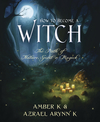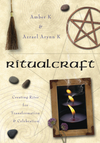Nine Challenges of Being a Witch

Witches are different, and not just because we celebrate the Goddess and the Horned God under the full moon. The true Witch lives in a world apart from mainstream consciousness, thinks and perceives and feels differently about herself and the universe.
Yet we live among others with different beliefs, perceptions, attitudes, and rules—which can seem very alien to a Witch. We cannot speak for all Witches, but many of us are repelled by a culture that is sundered from nature and poisons the Earth… that believes in a single god who often appears jealous and judgmental… that worships science without understanding much of it, while denouncing magick as fantasy… that worships money and possessions, even as it claims the material world is sinful and impure… and that preaches brotherly love while tolerating racism, the oppression of women, poverty, and injustice worldwide.
We believe that a huge part of mainstream culture must be transformed, replaced, or jettisoned in order for one to live a magickal life. Choosing or creating another way of life is a monumental, never-ending task. As we seek to understand what lies before us, we can identify at least nine major challenges facing those who have chosen the path of Witchcraft.
- Taking Self-responsibility: The real Witch takes responsibility for his or her actions and speech. We can't blame anyone else for the things we have done, the words we have spoken. We must lose the habit of blaming others for difficulties in our lives, no "The devil made me do it" nor "He made me feel so bad." We must not take refuge in fear or weakness, or the illusion that some hero or messiah will appear to fix our lives and make the world right. We ourselves cannot control the world, but can control ourselves—even our thoughts and feelings to a great extent. We must take responsibility for our self-care, our choices, and the way we live.
- Living with Nature: Witches choose to recognize that we are part of nature, which is the incarnate body of the Goddess. All is sacred—plants, animals, rocks, other living things, the air we breathe, the water we drink, the land upon which we stand. Therefore, to live in a sacred manner, we seek ways to exist in harmony with our ecosystem, and to attune the rhythms of our lives with the cycles of the seasons. Sometimes this means embracing silence, stillness, and non-action—letting things be in the natural world. Sometimes this demands that we change our habits and lifestyles in order to live more gently upon the earth. Sometimes this requires us to actively oppose those who would exploit, and destroy species, habitats, and resources. But at all times, we must be mindful and respectful, and seek to understand the world of which we are a part.
- Facing Our Shadow Side: Witches need courage to face the negative aspects of life, both in the outside world and within ourselves. We cannot buy into the paradigm that the world would be all bunnies and rainbows, if it weren't for "other people," the enemy du jour. Part of this is accepting the reality of our own pain, fear, and anger, and taking responsibility for what we do with them. We must enter the shadowy realms in our own minds and hearts, facing and illuminating, healing and transforming what we find there into creative energy—instead of something that controls us from an inner darkness, driving us to folly against our best instincts and without our understanding.
- Following a Different Ethic: Too many people follow laws and commandments without living in the spirit from which they sprang. Some do what is right only because they fear judgment. Some believe in "Doing unto others before they do unto you," and believe they can escape consequences of their actions. Witches live by the Rede, "An ye harm none, do as ye will," which counsels us to do nothing that will harm ourselves or others, insofar as that is possible. This is so much more difficult to accomplish than simply following a short list of rules. It takes knowledge and reflection, and it requires that we cherish ourselves and all living things, as well as our fellow humans. It requires that we think.
- Being Free: Freedom is more than civil rights and physical freedom. As Witches we must think for ourselves, and refuse to be guided by corporate advertising, dogmatic religions, or political ideologues. We must seek emotional independence as well, free from codependency or other unhealthy relationships, or subservience to others. We need to avoid addiction to anything that diminishes us: adepts "have the use of everything, and are dependent on nothing." Freedom requires not only vigilance, but awareness, self-discipline and determination.
- Having Faith: Our faith is not in prophets or church doctrine, in saviors or holy books. It is faith in the universe and in ourselves. Most of us trust that the Goddess provides, if we are willing to make a real effort. We believe that the wheel is always turning: sometimes life is hard and painful, sometimes joyous, but the cycles continue and the sun rises again. We believe the Goddess grants us freedom to find our true will, and once we commit to the path, she will open the gates to her infinite resources. As Goethe said,
"The moment one definitely commits oneself, then Providence moves as well…. Whatever you can do or dream you can do, begin it. Boldness has genius, power and magic in it."
We have faith that magic works, when we work. - Living in a Wider Reality: The consensual mainstream reality is based on limitation and fear. Though non-Witches are vaguely aware that we live a universe with hundreds of billions of galaxies, most limit their attention to the immediate physical world that can be felt, seen, or heard. Few are open to the many vibrational levels of existence, the astral planes or the shamanic underworld; the spirit realms of the nature devas, the Mighty Dead, the faery folk, and beyond. Witches accept a wider and deeper reality—one that is expansive, fluid, and magickal, filled with abundance and infinite possibility… as well as uncertainty, paradox, and the unknown. It takes a special kind of mind to imagine such a reality, let alone explore it.
- Working Magick: From time to time, we see mainstream fads that attempt to convince the public that they can transform their lives and have anything they want, usually with little effort. The tools are called by many names, and they practically guarantee vast wealth, romance, and inner peace, usually with just a little positive thinking and visualization. However, Witches realize that the mastery of genuine magick takes much more than that. It requires deep self-exploration to discover ones True Will or spiritual calling. Magick also demands years of study and practice, and labor to act in accord with magickal operations so that the new reality can manifest. We have more power to affect change than most people realize, but we also recognize that there are no easy shortcuts.
- Transforming Ourselves: "Everything She touches, changes." We embrace change instead of wanting things to stay the same–even change in ourselves. We seek to accomplish the Great Work. Eliphas Levi described it as "the creation of man by himself, that is to say, the full and entire conquest of his faculties and his future…." It is the highest purpose of magick, the goal of spiritual perfection, the mystical union of the Self and the All. There are many creative artists, writers, and musicians in Witchcraft, but the most challenging art of all is transforming ourselves. It requires great courage, and cannot be accomplished in one lifetime or perhaps many; yet it is the goal of the true magician and Witch.
Others will doubtless have different ideas about the Craft and what it asks of us, and that is a good thing, an essential thing. Uniformity of thought and belief has never been a hallmark of Witches, and we thank the Goddess for our diverse, original, maverick, and independent sisters and brothers in Wicca. We learn and grow from one another, and find wisdom.
In How to Become a Witch, we explore these issues further—the internal changes that one embraces to become a Witch in mind and heart. We invite you to explore this very challenging path with us—the path of Witchcraft.

About Amber K
Related Products


is subject to certain Terms and Conditions